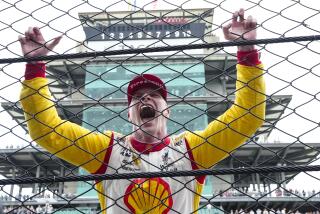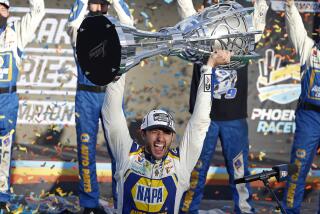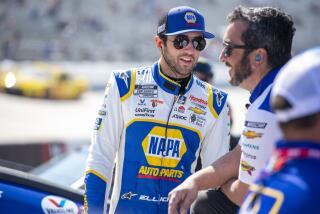Earnhardt’s Racing Team Has More Mature Look
- Share via
When the track announcer calls Dale Earnhardt Jr.’s name, the aluminum stands at Martinsville shake as if a small earthquake is rattling through the concrete that anchors them.
There is no doubting the connection he shares with fans. Like his father before him, Earnhardt is Everyman--blue-collar laborer, farmer, businessman, hero. As he stands on pit road before a race, he definitely can feel the love, a bonding that has deepened over the last year.
“I have fun with the fans, and I think they enjoy it,” Earnhardt says. “We have a great friendship.”
But the scene could have been completely different had Earnhardt, 27, not accepted the responsibility thrust upon him after his father’s death on the final lap of the 2001 Daytona 500. If Junior had become reclusive in the months that followed, his fans would have understood.
His every move drew intense scrutiny from the media and his compatriots and competitors in the Winston Cup garage. But he handled each challenge adroitly, whether on the track or in the boardroom of the motorsports empire his father built.
“After February 19, Junior was put under a microscope, and he rose to the occasion like an Earnhardt,” says Steve Crisp, who has worked with father and son at Dale Earnhardt Inc. during the last decade. “I always loved the kid like a pesky little brother, but now I respect him for the man that he’s become. He’s the 21st century version of his dad.”
Junior also happens to be Chevrolet’s strongest horse for the future. For the present, too, for that matter. He got Chevrolet’s first win of the season last Sunday at Talladega. Two years ago, the direction for Earnhardt’s career wasn’t so clear. After winning successive titles in the Busch Series, Junior’s team expected the same results in Winston Cup. When they didn’t come, finger-pointing began.
Veteran Winston Cup crew member Jeff Clark joined the No. 8 team after the move from the Busch Series. Clark thinks the confidence the core team brought from the two championships gave its members the impression that “they would come to Cup like gangbusters.”
“They were going to take this series by surprise,” Clark says. “‘They were going to break all of Jeff Gordon’s records, break all of Tony Stewart’s records. They had the capability to win every week, but the consistency wasn’t there.
“You have to be aware of the big picture. You can’t let your emotions get the best of you and boil back over into the crew.”
Although Earnhardt and his crew won two races, the team and the organization expected stronger results. Losing the rookie title to Matt Kenseth was a significant wake-up call. Losing the leader of team owner DEI three months later was the impetus to turn the program around.
The team finished 16th in points in Junior’s rookie year and rose to eighth last year, with three wins and 15 top 10s. But that wasn’t good enough. The team had to regain its cohesiveness.
“My guys and I have a little more dedication to each other and to making our cars work better,” Earnhardt says. “There’s more to a successful team than building a good racecar. Things like getting two personalities to jell nicely and not be conflicting all the time is real important.”
According to those at DEI, Junior’s attitude has improved dramatically over last year. Once some personnel issues were addressed and the finger-pointing ceased, the team could analyze its weaknesses on the track. Junior was excelling on the superspeedways, but his short-track and road-course performances were falling short.
Road-course questions won’t be answered until June, but the improvements he has made at Bristol and Martinsville and even at Darlington, a smaller, difficult track, have been impressive. He has led 222 laps in short-track competition and had career-high finishes at Darlington, Bristol and Martinsville.
Dave Charpentier, DEI’s engineering manager, says the team has learned to use all of the resources that an organization of its size has to offer, especially when it comes to testing. “We’re constantly adding people and state-of-the-art equipment to offer the teams the latest technology possible,” Charpentier says.
Earnhardt says testing and additional experience on the short tracks have been beneficial to the team.
“We are going to the track with better-handling cars, at least most of the tracks,” Earnhardt says. “Performance turns into confidence. I haven’t changed much about my driving style, but I haven’t tried to overdrive the car so much. I was doing that a lot.”
Slowly, Junior is casting aside his bad habits, on the track and off. Before the season, he said he wanted to prove to his critics that “there’s more to me professionally than just magazine covers ... and fun times.”
And like his father and grandfather, Ralph, this Earnhardt won’t be satisfied until he wins the title.
“I want to win championships,” Junior says. “There’s something to be said about having that asterisk beside your name for the rest of your life and the rest of the time in the books that says you were champion sometime in your life.”
More to Read
Go beyond the scoreboard
Get the latest on L.A.'s teams in the daily Sports Report newsletter.
You may occasionally receive promotional content from the Los Angeles Times.










